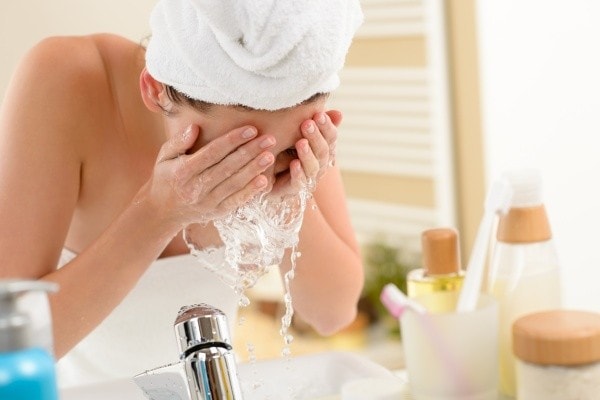Ulcers and skin infections due to facial cleanser
Every day we use cosmetics everywhere, from facial cleanser to makeup, skin care, shampoo... but we do not pay attention to their harmful effects.
In particular, facial cleansers can cause skin ulcers and infections. The nursing department at Columbia University Medical Center in New York made a shocking announcement: acne cleansers are no better than regular soaps. In fact, most doctors recommend that when you have acne, you should see a dermatologist. Because there is no way that facial cleansers can treat acne like antibacterial soaps can… kill all bacteria and germs.
 |
| Facial cleanser can cause skin ulcers and infections. |
Dr. Phan Duc Binh - Vice President of the Ho Chi Minh City Consumer Association said that in the past, when cosmetic technology was not yet developed, people knew how to use fresh cow's milk for bathing or making face masks. Because cow's milk has the effect of cleaning and softening dry or aging skin. In the next stage, people created soap for cleaning mainly. Later, with the explosion of science and technology, many types of creams and milks with moisturizing ingredients replaced outdated bar soap.
In fact, the ingredients of facial cleanser, in addition to cream and milk, also contain water, fragrance, and emollient, humectant, and smoothing agents... mainly extracted from vegetable oils or mineral oils such as coconut oil, olive oil, sunflower oil, lanolin, glyceryl palmitate, tromethamine, sorbitol, vitamin E, sodium carbomer...
Most notably, glycerin - one of the most powerful moisturizers, has the ability to absorb fat and water, and is often used to bind water and fat, forming a milky emulsion that people often call... milk. For this type of "milk", even if washed with clean water many times, glycerin still remains a little on the skin, has a moisturizing effect to keep the skin smooth, limit dry, cracked, and aging skin.
Dermatologists all agree that the above substances are effective for people with dry, aging skin. However, a French cosmetics brand director admitted that, for profit, manufacturers did not give consumers a "warning". Specifically, if oily skin or acne-prone skin uses products with high moisturizing ingredients, acne will appear more often. If used for a long time, it can cause ulcers and skin infections.
As for facial cleansers containing disinfectants such as triclosan or antiseptics, Dr. Binh warns that they are very harmful to normal and acne-prone skin. According to Dr. Binh, normally on the surface of the skin and pores there are always millions of bacteria, of which 99% are harmless, if not beneficial. And when there is an "opponent" - even just 1%, these beneficial bacteria will protect themselves and cause disturbances, creating conditions for harmful bacteria to thrive. Therefore, rashes and pimples appear.
DS Binh also recommends that for normal and oily skin (prone to acne), you should only use plain soap with 70 parts oil made from grease and sodium hydroxide, the rest is color and scent, without adding any other substances. For dry skin, choose the type with added humectants (moisturizer).
Dr. Huynh Huy Hoang - Head of Clinical Department 2, Ho Chi Minh City Dermatology Hospital also noted: do not use too much milk, if the cleanser remains on the skin, it will make the skin rough and bumpy, you should dilute the cleanser with water and create a foam before applying it to the face, do not use cleanser containing alcohol, because it will easily cause irritation and allergies to the skin. Finally, advice for consumers is to read the ingredients carefully before use.
Be aware of the toxins that may be contained in facial cleansers.
Sodium Lauryl Sulfate (SLS) and Ammonium Lauryl Sulfate (ALS)
This chemical is commonly used in shampoos, toothpastes, facial cleansers and bubble baths. SLS and ALS can cause serious skin irritation and are easily absorbed into the body (brain, heart, lungs and liver), leading to many long-term health problems. It can penetrate the skin, destroy the skin's protective function, cause bladder and kidney infections, and cause reproductive disorders.
Propylene Glycol (PG)
Found in many lotions and cleansers, PG can cause skin irritation and dermatitis, and has been shown to cause liver and kidney damage.
Paraben
What the industry calls a preservative, its purpose is to maintain or extend the shelf life of products. Parabens are commonly found in skin care products. Parabens can be a medical hazard, especially since they have been found in breast cancer patients. Milder parabens can cause allergies or endocrine disruption.
Thiazolinone
It is a preservative for many cosmetics that helps prevent bacteria, is present in many different cosmetics and has recently been discovered to cause cancer and allergies.
According to AloBacsi.vn






